

Seerat un Nabi in Urdu Essay with headings | سیرت النبی پر مضمون
Seerat un Nabi Sallallaho Alaihi Wasallam essay in Urdu for students explores the life and character of Prophet Hazrat Muhammad (S.A.W), the final messenger of Islam. It provides a comprehensive account of his birth, upbringing, prophethood, teachings, and the impact he had on the world. It discusses his noble lineage, being born into the respected Quraysh tribe in Mecca in 570 CE, and his early life marked by virtues such as truthfulness, trustworthiness, and wisdom.
In this post, I write a best Seerat un Nabi in Urdu essay with headings, pdf, and quotations for classes 12,8,6,3,2 and others in easy and short wording.
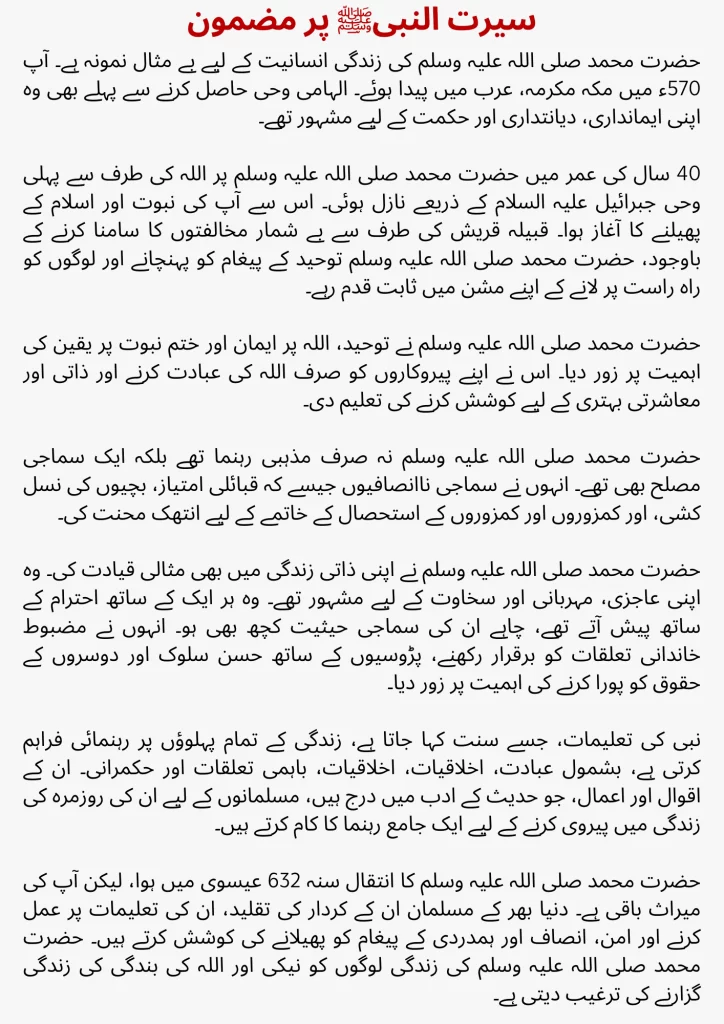
Seerat un nabi (S.A.W) essay in Urdu free pdf download
Seerat e Rasool is a comprehensive study of the life of Prophet Muhammad (PBUH), encompassing his birth, upbringing, prophethood, and teachings. It covers his exemplary character, struggles and challenges, divine revelations, and ultimate mission of spreading Islam.
The study of Seerat un Nabi provides invaluable insights into the life and teachings of the last Messenger of Allah, serving as a source of guidance and inspiration for Muslims worldwide.
In conclusion, the life of Hazrat Muhammad (PBUH) is a profound example of righteousness, humility, compassion, and devotion to Allah. His teachings and actions serve as a guiding light for Muslims, inspiring them to emulate his character and strive for excellence in all aspects of life.
Note : I hope you understand the essay on Seeratun Nabi Sallallaho Alaihi Wasallam in the Urdu language in easy and best wordings. You can also read
Taleem e Niswan Essay in Urdu
Eid ul Adha Essay in Urdu
Allama Iqbal Essay in Urdu
Mehnat ki Azmat Essay in Urdu
what is seerat un nabi (S.A.W)?
Seerat un Nabi, also known as the Biography of the Prophet, refers to the comprehensive study of the life of Prophet Muhammad (PBUH). It encompasses various aspects of his life, including his birth, upbringing, family background, prophethood, teachings, struggles, achievements, and the social and political changes brought about by his mission. The study of Seerat un Nabi provides a deep understanding of the Prophet’s character, exemplary conduct, and teachings, providing guidance and inspiration for Muslims to follow his path.
how old was prophet Muhammad (S.A.W) when his father died?
Prophet Muhammad (PBUH) was born in the year 570 AD. His father, Abdullah, passed away before he was born. Therefore, Prophet Muhammad (PBUH) did not have the opportunity to meet his father as he was orphaned at a very young age.
Who is the father of our beloved prophet (P.B.U.H)?
The father of Prophet Muhammad (PBUH) was Abdullah ibn Abdul-Muttalib.
In which Hijri Hazrat Muhammad (S.A.W) performs hajj?
Hazrat Muhammad (PBUH) performed the farewell Hajj, also known as Hajjat al-Wida, in the year 10 AH (After Hijrah).
when Hazrat Muhammad (S.A.w) married hazrat khadija?
Hazrat Muhammad (PBUH) married Hazrat Khadija bint Khuwaylid in the year 595 AD, before the start of his Prophethood. Hazrat Khadija was the first wife of the Prophet and their marriage lasted for approximately 25 years until her passing in the year 619 AD.
Is this the complete Hazrat Muhammad (S.A.W) essay in Urdu?
Yes, is it you can also learn and write this essay in your exams.
Leave a Comment Cancel reply
Save my name, email, and website in this browser for the next time I comment.

Essay on Seerat-e-Nabvi in Urdu
Back to: Urdu Essays List 3
سیرت نبوی پر ایک مضمون
پیارے نبی حضور صلی اللہ علیہ وسلم بہت ہی عظیم ہستی ہیں۔ حضور کا کسی بھی عام انسان کے ساتھ شمار نہیں کیا جا سکتا۔ اللہ کے محبوب اور ہمارے سب سے آخری پیغمبر پیارے نبی ہی ہیں۔ ان سے ہی ساری دنیا میں مکمل اسلام پھیلا۔ ان کے اخلاق کی جتنی تعریف کی جائے اتنی کم ہے۔ ان کے خوش اخلاقی نے ہی سب کے دلوں کو جیت لیا اور کافر بھی کلمہ پڑھ کر مسلمان ہوگئے۔
پیارے نبی کے آنے سے عرب بلکل جگمگا اٹھا۔ اندھیرا دور ہوگیا اور جہالت ختم ہوگئی اور سارے عرب میں چین و سکون ہوگیا۔آپ کی سیرت صرف عرب کے لیے ہی نہیں بلکہ پوری دنیا کے لئے مثال ہے۔آپ بےحد رحم دل تھے۔ اللہ نے آپ کو دنیا کے ظلم ختم کرنے اور ساری دنیا میں اسلام قائم کرنے کے لیے بھیجا۔ آپ دنیا میں ہر بوڑھے، بچے، جانور سبھی سے محبت کرتے تھے۔ اپنی قوم ہو یا دوسری قوم٬ اپنا ملک ہو یا کوئی اور ملک٬ یہاں تک کہ جو لوگ دنیا سے رخصت ہوچکے ہیں ان کی بھی محبت حضور کے دل میں رہتی تھی۔
قرآن پاک میں اللہ تعالی اپنے نبی کے سب سے اعلٰی درجہ کے اخلاق ہونے کے لئے قسم کھا رہا ہے۔ ان کا یہ مقام و رتبہ ہے کہ خدا خود ان کی تعریف کر رہا ہے۔ان کی سیرت، ان کی خوش مزاجی ان کی روزمرہ کی زندگی سے پتہ چلتی ہے۔ ہمارے نبی کریم سچ کے راستے پر چلنے والے تھے۔ جھوٹ زبان پر کبھی آیا ہی نہیں۔ میٹھی زبان بولنے والے تھے جن کا ہر لفظ دشمن کے دل کو بھی پگھلا دے۔ حضور اکرم صلی اللہ علیہ وسلم کے آنے سے عرب میں ہونے والے ظلم مٹنے لگے اور عورتوں کو اعلیٰ مقام دیا گیا۔
اس کے پہلے جب حضور اس دنیا میں تشریف نہیں لائے تھے تو اس دور میں بیٹیوں کو زندہ دفنایا جاتا تھا۔ ان کے آنے سے ہی یہ دور ختم ہوا جس کی وجہ ان کا اخلاق تھا۔آپﷺ بچوں سے بہت زیادہ محبت کیا کرتے تھے اور یتیم بچوں سے تو اور بھی زیادہ۔
حضور اکرمﷺ نے ساری دنیا کو اسلام کے بارے میں محبت سے سمجھایا۔ بلکہ بہت ہی نرم مزاجی سے بتایا کہ اللہ ایک ہے اور اللہ کو مانو۔ وہی دنیا کا مالک ہے۔ وہی زندہ کرنے والا اور وہی مارنے والا ہے۔
شروع میں تو حضور کی باتیں لوگوں کو سمجھ نہیں آئیں اور سارے لوگ حضور پر ظلم کرنے لگے لیکن اللہ کے نبی نے امید نہیں چھوڑی اور ہر ایک شخص کے ساتھ نرمی سے پیش آتے رہے۔ اسی طرح دھیرے دھیرے اسلام مکمل طور سے پھیل گیا۔
پیارے نبی ﷺ کی خاص باتیں
- • پیارے نبی فرض نماز سب کے سامنے پڑھتے اور نفل نماز چھپ کر پڑھتے تھے۔
- • پیارے نبی کبھی غصہ نہیں کرتے تھے۔
- • زیادہ سے زیادہ عبادت کرتے تھے اور اپنی امت کے لئے رو رو کر دعائیں مانگا کرتے تھے۔
- • نبی کریم رجب کی ستائیسویں شب کو معراج پر گئے تھے۔
- • حضور کبھی دو سالن نہیں پسند کرتے تھے (دو سالن کا مطلب اوپر سے گھی وغیرہ ڈالنا)
- • حضور فاکے کی زندگی زیادہ بسر کرتے تھے۔
- • پیارے نبی ہمیشہ چہرے پر ہلکی مسکراہٹ رکھتے تھے اور قہقہ لگانا انہیں سخت ناپسند تھا۔
- • حضور کریم کے جسم کا سایہ نہیں تھا۔
- • اللہ نے کلام پاک پیارے نبی پر نازل کیا۔
اللہ نے اپنے محبوب کو مظلوموں کا مسیحا بناکر بھیجا۔ ان کے آنے سے جتنی بھی باطل حکومتیں تھیں وہ ڈر سے کانپنے لگیں۔ آپ دنیا میں حق کی طرف داری کرنے آئے اور ساری دنیا کو اسلام سے روشن کر دیا۔
JavaScript seems to be disabled in your browser. For the best experience on our site, be sure to turn on Javascript in your browser.
We use cookies to make your experience better. To comply with the new e-Privacy directive, we need to ask for your consent to set the cookies. Learn more .

- Compare ( )
- Create an Account

Sign In / Register
A Comprehensive Review of The Book “Seerat Un Nabi”
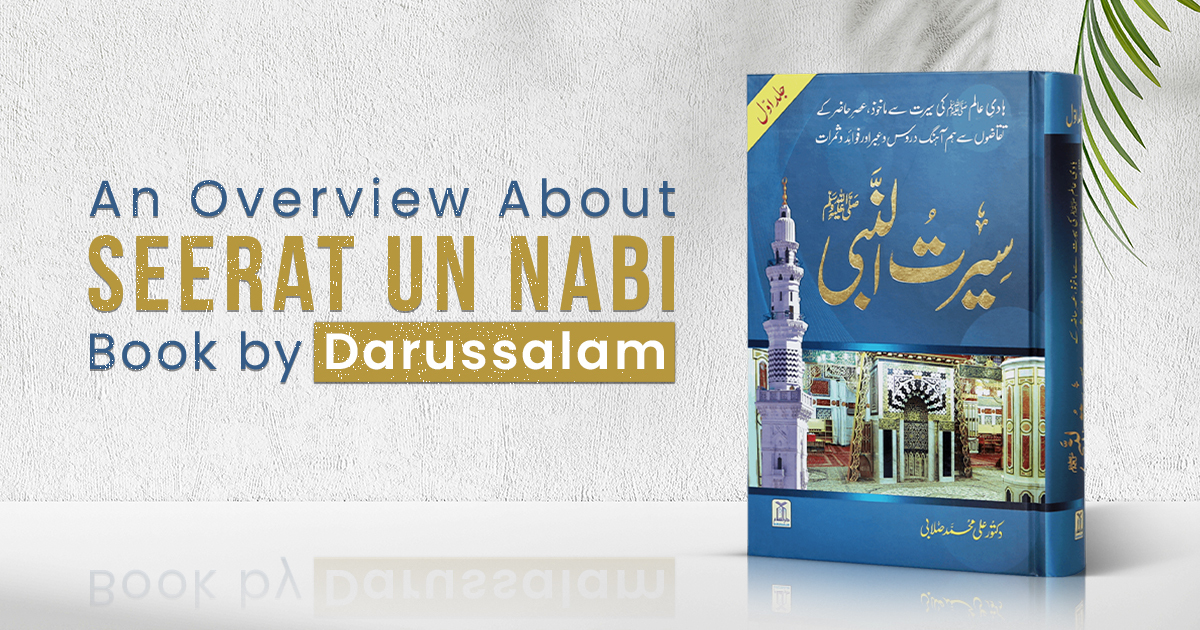
A Comprehensive Review of The Book “Seerat Un Nabi”
In the vast realm of literature, certain books stand as beacons of enlightenment, guiding readers through the corridors of time and wisdom. " Seerat Un Nabi ," a profound exploration of the life of the Prophet Muhammad (Peace and Blessings of Allah be upon him), is one such masterpiece.
Let's embark on a journey through this comprehensive review, unraveling the chronicles of events, lessons, Islamic rulings, and the transformative impact on the character that this book and our other seerah books encapsulate.
Chronology of Events in "Seerat Un Nabi" Book
Birth to passing.
The story in the book is so keenly detailed starting with the day of birth of the honorable Prophet Mohammed (P.B.U.H) up to the day his soul departed from this temporary world.
Through each chapter, the reader is made aware of the defining events and moments that would change his views regarding Islam for betterment. The book not only contains the life of the Prophet but also cultures, and the ideal way of living described in the book.
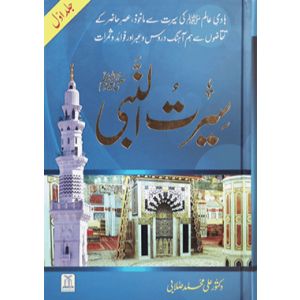
Historical context
The book brings life to the narrative and gives readers an insight into the socio-culture through which the Prophet traversed to reach Medina.
Indeed, anyone will simply be compelled to admire how these events happened from the beginning to the end of his days after he became the messenger of Allah. Imagine a compelling novel, but one based on true events that influenced millions for over two thousand years.
Lessons and Morals of The Book
More than a narrative.
“Seerat Un Nabi” goes beyond a simple narrative of events to include lessons derived from the Prophet’s activities and deeds. Each occurrence is a mystery to be considered by the reader concerning its relevance in space and time.
Relevance for All Ages
The book serves as a sort of Moral compass outlining ageless morals as vital today as during Muhammad’s time. The lessons range from being kind to showing patience when confronted with problems and even forgiving in a hostile world. These lessons are simply put and could be understood by children also developing values for a lifetime.
Islamic Rulings in Seerat Un Nabi Darussalam
“Seerat Un Nabi” explores Islamic rulings that are drawn from the life of the Prophet (P.B.U.H). Islamic jurisdiction emerged as a result of meticulous analysis of many incidents related to different aspects of law and ethics in the book. It helps readers to appreciate or understand all the rules or the principles instructed or practiced by the Prophet (P.B.U.H).
Decoding Islamic Principles
They are clearly explaining complex concepts of Islamic law even to those who might not be aware of such. No matter how much you know about Shariah law or if this is your first time reading about it, this book will surely help you understand the foundations of morality that the religion of Islam is built on.

Impact on Character
One important aspect that stands out in “Seerat Un Nabi” is the role played by the Prophet’s life in the transformation of a person’s character. It goes beyond the historical account and invites readers into a discussion of individual development. It ties the story of the Prophet’s life to a set of universal moral values that are aimed at shaping people’s personalities and habits.
This issue is especially relevant for young readers. Stories about prophets change into something greater than mere tales of history. It is a compass that will help them grow as kids and develop the necessary ethics.
In summary, every person has a reason to study the life of the Prophet (P.B.U.H). Islam is an exclusive religion because its doctrines and practices are open only to true believers. The book does not merely provide historical accounts; rather it provides a perennial counsel whose wisdom transcends cultures and epochs.
Summarizing such a deep journey leaves one in tears because of its rich lessons, strong Islamic teachings, and its effect on moral character. “Seerat Un Nabi” calls to mind self-improvement as well as a reflection towards its teaching, which reverberates similar traits manifest by our Prophet Muhammad (May peace and blessings be upon him).
Buy Online from Your Respective Store
Seerat Un Nabi - Darussalam UK
Seerat Un Nabi - Darussalam UAE
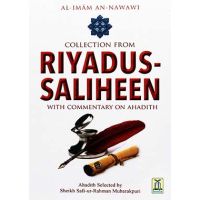
- Book Reviews
- Health Blogs
- Time Management
- Islamic Rituals
- Human Rights
- Gender Equality


الشیخ محمد خیر محمد حجازی مولانا مکی دامت برکاتہم
In the voice of Maulana Makki (Senior Hanafi Shaykh in Makkah), bayanaat on seerat life of beloved Prophet Muhammad ﷺ in most effective way, in which life of Arab before the birth of Prophet Muhammad ﷺ & after he departure from this world, narrations described in an heart whelming way.

Home | Seerat Un Nabi
- Seerat Books

© Copyright 2021 Seerat-un-nabi.com. All rights reserved!
1 - Makki Daur Mecca 2 - Wiladat Birth 3 - Bachpan Childhood 4 - Larakpan Teenage 5 - Jawani Youth 6 - Nabuwat Prophecy 7 - Dawat Proclamation 8 - Khufia Dawat Secret Invitation 9 - Elania Dawat Open Invitation 10 - Hijrat Habsha Migration 11 - Bairuni Dawat Foreign Invitation 12 - Khadija (ra) Year of Grief 13 - Meraj Travel To Heavens 14 - Madina City 15 - Hijrat Migration 16 - Madina Arrival 17 - Madina Demographics 18 - Masjid Nabwi Mosque 19 - Khatraat Jihad Dangers 20 - Hijri Year 1 Prayer 21 - Hijri Year 2 Wars 22 - Badar War 23 - Badar War Details 24 - Badar Effects of War 25 - Fatima (ra) Eid Hajj 26 - Hijri Year 3 Marriages 27 - Uhad War 28 - Uhad Strategy of War 29 - Uhad Return from War 30 - Uhad War Lessons 31 - Shariat Laws 32 - Hijri Year 4 33 - Bani Nuzair War 34 - Hijri Year 5 35 - Khandaq Ahzab War 36 - Banu Qurayza War 37 - Hijri Year 6 Sulah Hudebia 38 - Foreign Ambassadors 39 - Hijri Year 7 Jewish Wars 40 - Hijri Year 8 To Mecca 41 - Mecca War 42 - Mecca Conquered 43 - Hunain Taif Wars 44 - Hijri Year 9 Tabuk 45 - Hajj Abu Bakr 46 - Hujjatul Wida Last Sermon 47 - Hijri Year 13 Last Journey
1. A graphical and illustrative presentation (CHARTS) of the Life of Muhammad (pbuh) in Urdu language. 2. Seerat Nabvi by Tibri, Kathir and Khaldoon in Urdu language. 3. Al-Raheeq Al-Makhtoom in Urdu language. PDF Format 4. Al-Raheeq Al-Makhtoom in English language The Sealed Nectar in PDF Format 5. Brief Story of Muhammad's Life (pbuh) in English language. 6. Timeline of Muhammad's Life (pbuh) in English language.
Seerat Nabvi by Tibri, Kathir and Khaldoon in Urdu language
Here are 3 brief versions of the Sirat Nabawi (saw) or Life of Mohammad (pbuh) in Urdu as narrated by historians and referenced by all scholars and writers for accurate historical background.;
1. Tareekh Alumam Walmaluk by Jarir Ibn ul Tibri (Born 855AD, 224h, Died 941AD, 310h)
2. Tareekh Albidayah Walnihaya by Imaduddin Ibn Kathir (Born 1363AD, 701h. Died 1405AD, 774h)
3. Kitabul Tawarikh by Abdul Rehman Ibn Khaldoon (Born1363AD, 732h. Died 1439AD, 808h).
Click the following links to start reading;
Cover , Contents & Introduction 1 , Introduction 2
Parveen Malik, Yasir Jawad, Sarang Publications, Alaku Mansion, Patiala Ground, 14 Link McLeod Road, Lahore, Pakistan.
Izhar Sons, 19 Urdu Bazar, Lahore. Ph: 92-42-7230150. 9-Rattigan Road, Lahore. Ph: 92-42-7220761, [email protected] website www.izharsons.com
Al-Raheeq Al-Makhtoom (Urdu)
To download the PDF version of Al-Raheeq Al-Makhtoom Book, Click Here . To continue browsing the book via images, click any of the links below;
Cover , Table of Contents: 1 , 2 , 3 , 4 , 5 , 6 , 7 , 8
Courtesy: Al-Maktaba Al-Salfiah, Sheesh Mahal Road, Lahore 54000. Pakistan. Ph: 042-7237184 Fax: 042-7227981
Al-Raheeq Al-Makhtoom (English)
English Language: There are three versions of the "Life of Muhammad (pbuh)"
1. Brief Version (At the bottom of this page)
2. " This is Mohammad (pbuh) " Life of Rasulullah (saw) in Adobe PDF format.
3. Detailed Version ( Click Here for the book Al-Raheeq Al-Makhtoom, The Sealed Nectar). Or if you prefer to view the book via images, click any of the corresponding page from below;
Brief Story of Muhammad (s.a.w.s.)'s Life
Birth and Prophethood: Prophet Muhammad (s.a.w.s.) was born of a noble family of Banu Hashim ancestry. However, he was not fortunate enough to have been born wealthy as he was born an orphan. His father, Abdullah bin Abdul Muttalib, died of sickness at the age of 25 on a trading journey to Syria, leaving his wife Amenah only a few months pregnant. Muhammad’s Birth: His birth was on the twelfth (12) of Rabiul Awwal 53 B.H. (570 A.D of the Christian era) was ordinary and has no significance in Islam and the celebrations on this occasion have nothing to do with shari'ah and some people consider it Bid’ah. Abdul Mutalib, his grandfather who was the chief of Makkah at that time, showed pride in him as Muhammad (s.a.w.s.) compensated him for the loss of his son who died in the prime of his youth. His mother showed affection for her son as she awaited the best nurses to come and take care of him: The tradition at that time was that nurses would come from the desert seeking to be the custodians of the children of nobility in return for good pay and gifts. Giving that Muhammad (s.a.w.s.) was not wealthy all nurses turned away from him, Halimah of the Banu Saad tribe was one of them, but when she could not find any other child she was ashamed to return home empty handed, so she went back and took Muhammad (s.a.w.s.), and since then Allah showered his mercy on her; for instance animals started giving plenty of milk after they had been dried. Therefore, her and her husband felt they were blessed to have taken Muhammad (s.a.w.s.) and became very attached to him. Muhammad (s.a.w.s.) spent five years with Banu Saad during which nothing out of the ordinary happened except one told incident which scared Halimah and became known as “the splitting of his chest.” When he was playing with the other boys Jibril held him, threw him down, split his chest, took out his heart and took out a clump from it and said: “this is Satan's portion of you.” Then he washed him in a basin made of gold with the water of zamzam, then sealed his chest and returned him where he was. The boys ran to Halimah and said Muhammad (s.a.w.s.) has been killed. They came back and found him alive but pale. (Reported by Anas in the Hadith compilations of Muslim and Ahmed) Muhammad (s.a.w.s.) returned to Makkah at the age of five to his mother and grandfather who took good care of him, but the days refused to allow him tranquility among those tender hearts, as his mother died during a visit to Madinah to visit her husbands grave. She took Muhammad (s.a.w.s.) and his maid Umm Aiman with her. On the way back, she fell very sick and died in Abwaa leaving Muhammad (s.a.w.s.) with Umm Aiman. His grandfather always took good care of him and never left him alone, he took him to all public gatherings. However, at the age of eight, Abdul Muttalib died leaving him into his uncle Abu Talib’s care. Since Abu Talib had many children and was not wealthy, Muhammad (s.a.w.s.) insisted on sharing the burdens of life with him. He went with his uncle on a trading journey to Syria at the age of thirteen. He met a monk called Bahira during the journey, who looked at his face and the sign on his back (the sign of Prophethood) and asked Abu Talib: “What is this boy to you ?”My son he said.” “His father should not be alive.” Said Buhira. Abu Talib then said, “Yes, in fact he is my brother’s son “and told him the rest of the story. The monk said “Now you are telling me the truth. Take him back and be careful of the Jews over him.” Muhammad (s.a.w.s.) then returned to Makkah and resumed his life, working as a shepherd in his early life. He did not acquire knowledge or education from a monk or a philosopher or sorcerer, as was the norm then. Instead he read through the pages of life and took what he found good. He combined the good qualities of discipline with spiritual purity, rightness and contentment. In this manner, he entered his third phase of life and got acquainted with his first wife Khadija (r.a.) who was a merchant woman of nobility and wealth. She had heard of his truthfulness and trustworthiness, so she offered him to take her trade to Syria (before marrying him). He was 25 years old and she was 40 years old when they got married. Their marriage lasted until she died at the age of 65. The Message of Islam: Every year, Muhammad (s.a.w.s.) used to leave Makkah to spend Ramadan in the cave of Hiraa where he used to meditate and worship for self-purification away from the falsehood of Jahilia. In this cave, He met with the heavenly host and listened to the voice of the angel telling him to read. He knew that he had become a Prophet of Allah (s.a.w.s.) and that it was Jabril, the ambassador of revelation who came to him; then the mission’s struggle began. Quraysh spared no efforts to fight Islam and persecuted those who embraced it. The Prophet (s.a.w.s.) and his companions abused, ridiculed, humiliated, accused of indulging in magic, and the weak and oppressed believers were tortured until they disbelieved, died or swooned (as they had no clan to defend them). In spite of all that Islam grew stronger, so Quraysh decided to change strategy and agreed not to buy, sell or intermarry with Muslims or those who approved of their religion, protected them or sympathized with them. They wrote this agreement which was called “The General Boycott” on a piece of parchment and hung it inside the Kaabah as a secret pact. Therefore, Muhammad (s.a.w.s.) and his followers were forced into confinement in the Vale of Banu Hashim where they were cut off of any assistance. This boycott lasted three long years during which only the bond of faith kept the hearts together and gave them strength. It ended after Hisham Ibn Amr (who felt very upset about the terrible plight of Muslims) gathered some clans around him and agreed to break the pact. They went to Makkah to tear the parchment and to their surprise they found that the worms had already eaten it up except the words: “In Your name O God.” After ten years of suffering for the mission of Islam, Muhammad (s.a.w.s.) suffered the loss of his wife Khadijah and his uncle Abu Talib, in other words, he had lost his public life, as his uncle defended him and protected him from any calamity, and his private life, as Khadijah loved, supported and shared with him the miseries and pains of the Da’wah. Muhammad ’s Attractive Leadership: Muhammad led a very ordinary life yet the life style he practiced offered an example for others to follow. So this is an invitation to search through the Prophet (s.a.w.s.) lifestyle and adopt what he did in his daily activities. To start with read what Al Hasan (son of Ali) said about the Prophet of Allah (s.a.w.s.) “Doors are not locked under him, nor do door keepers stand for him, and trays of food are not served to him in the morning or the evening. He sits on the ground and eats his food from the ground. He wears coarse (rough) clothes and rides on a donkey with others sitting behind him, and he licks his fingers after taking food.” His regular deeds: His habits were really simple in all aspects of his life as we see. He never started any activity without saying “In the name of Allah.” Sleeping Habits: Aisha (r.a.) said that the Prophet (s.a.w.s.) used to sleep during the earlier part of the night and stood praying during the later part. She also said that when he got up at night he started his prayer with two rakaat. When Allah’s Messenger (s.a.w.s.) went to bed he “Used to lie down on his right side and said: O Allah I surrender myself to you, and seek protection in you, longing for you and fearing you; there is no protection and no escape from you except with you, I believe in your book which you sent down and your Prophet (s.a.w.s.) whom you sent down and your Prophet (s.a.w.s.) whom you sent.” (Bukhari) Then he used to read Surah Al Ikhlas and Al Muawathatein (Surah Al -Falaq and An-Naas) three times. (Dawud and Tirmithi) Praying: Ibn Omar (r.a.) said that at night, the Prophet (s.a.w.s.) used to pray rakaat in two then finished with one, and he used to supplicate saying: “O Allah, forgive me my sins and my ignorance, my excesses in my matter and what you know better than myself. O Allah forgive me the wrongs (I did) lightly and seriously, and my accidental and intentional transgressions and all that is with me.” (Bukhari) For Fajr prayer, he used to pray two short rakaat between the call and the Iqama and also read Qur’an. According to him “Qur’an at dawn is always witnessed by the angels of the nights and the angels of the days.” (Tirmithi) Bathing, Ablution and the Call of Nature: Aisha (r.a.) said that the Prophet (s.a.w.s.) used his right hand for ablution and taking food, and the left hand for the toilet and the like. When bathing from janaba, Aisha said, “he would begin by washing his hands, then he made ablution as for prayer, then he puts his fingers in water and runs them through the roots of his hair and then poured handfuls of water with his hands over his head and let the water flow all over his body .” (Bukhari) The Prophet (s.a.w.s.) said: “It is an obligation on every Muslim to bathe at least once every seven days and wash both his head and body.” (Bukhari and Muslim) As far as ablution is concerned, Allah’s Messenger (s.a.w.s.) said: “He who makes ablution and makes it the best way, his sins leave his body, even from beneath his nails.” (Muslim). In the hadith compiled by Imam Bukhari it was narrated that when the Prophet (s.a.w.s.) got up from sleep for Tahajjud prayer, he cleansed his mouth with a tooth-stick (miswak). As far as answering the call of nature is concerned the Prophet of Allah (s.a.w.s.) said “He who relieves himself should be concealed from the view of others .” (Abu Dawud) and “Two people should not go out together to relieve themselves, uncovering their private parts and talking to each other, for Allah abhors this.” (Ahmad and Abu Dawud) He also told Omar, “Do not pass water while standing.” When he entered the toilet he used to say “O Allah I seek refuge in You from all kinds of evils.” (Bukhari) And when he came out of the toilet he used to say “Grant Your forgiveness.” (Tirmithi) Clothing: Umm Salama (r.a.) said “The piece of clothing best liked by Allah’s Messenger (s.a.w.s.) was the shirt.” (Tirmithi) When he put on a shirt, he used to begin with the right side and says “Praise be to Allah who clothed me with this.” And he forbade us to exaggerate in our clothing when he said: “Eat, drink and wear good clothes as long as these things do not involve excess, and arrogance.” (Ahmed) In another hadith it was narrated that Allah’s Messenger (s.a.w.s.) cursed the man who puts on woman’s clothes and the woman who puts on men’s clothes.” (Abu Dawud) Eating and Drinking: Allah’s Messenger (s.a.w.s.) used to invoke the name of Allah before eating and also before washing his hands before and after eating. He used to say, “The blessing of food is received by washing the hands before and after taking it.” (Tirmithi and Abu Dawud) Muslim also reported that “Allah’s Messenger (s.a.w.s.) used to eat with three fingers and he licked his hand before he wiped it.” The Messenger (s.a.w.s.) told Abu Salma (r.a.) “Invoke the name of Allah, and eat with your right hand and eat what is near.” (Muslim) And he also said, “If dinner is served, and Iqama for prayer is (also), then take the dinner first.” (Bukhari) Manners of Speech: Prophet Muhammad (s.a.w.s.) used to start his speech with salam. He says: “Saying salam comes before talking.” (Tirmithi) And he teaches us not to talk unnecessarily saying: “Do not talk without remembering Allah, for talking without remembering Allah hardens the heart.” (Tirmithi) He never used obscene talk nor did he listen to it, nor did he listen to anything about anyone. Aisha (r.a.) said that “His speech was clear and distinct such that all those who listened to him understood him.” (Abu Dawud) General Conduct in Living with People: Allah’s Messenger (s.a.w.s.) used to say salam when he arrives where people are seated and when he wishes to leave, he also says salam as “the former is as appropriate as the latter.” (Abu Dawud) He did not like people exalting him “He came out once leaning on a stick and a group of people stood up, he said: don’t stand up as foreigners stand up exalting each other therewith.” (Abu Dawud) When visiting people, he used to ask permission to enter saying “Peace be upon you, may I enter.” (Abu Dawud) and when his guests are leaving he used to go with them to the door of the house. Allah’s Messenger (s.a.w.s.) used “to receive gifts and to give gifts back.” (Bukhari) and he said “Make gifts to one another for a gift removes rancour from the chest.” (Tirmithi) At home, he used to serve his family. Aisha was asked about what the Prophet (s.a.w.s.) used to do in his house, she said “He used to work for his family, that is to serve his family, and when prayer time came, he goes out for prayer.” (Bukhari) Death of the Prophet (s.a.w.s.) The pains of sickness attacked the Prophet (s.a.w.s.) since the ending of Safar of the eleventh year. Once he fainted and his family put medicine in his mouth. When he awoke, he showed his dislike of that. During his illness he would supplicate “O Allah help me in the pangs of death.” (Bukhari: narrated by Aisha) He was warning Muslims -- even when he was in the throes of death -- that they should stay committed to monotheism by saying “Allah’s curse be upon the Jews and Christians, they took their Prophet (s.a.w)’s graves as mosques.” (He was warning them against the action.) (Al-Shaikhan) The last thing the Prophet (s.a.w.s.) did before his death (according to Aisha): “He lay down in my lap, brushed his teeth harder than he had ever done before ”, then his eyes were fixed and he was saying “Nay, the Companion on high from paradise.” I said to myself “You were given the choice and you have chosen, by Him who sent you with the Truth.” Then, he passed away.” (Bukhari) This was a brief study of the Prophet (s.a.w.s.)’s way of life. It must be stressed that we will never really understand the Sirah unless we study the Qur’an and Sunnah. Praise and Glory be to Allah, we seek Allah’s forgiveness and we turn to him in repentance. Written by Shadiah Hamza Sheikh, Ph. D. (SWT): Subhanahu wa Ta'ala – ‘The Exalted’ (s.a.w.s.) : Sall-Allahu ‘Alayhi wa Sallam – ‘Peace and Blessings of Allah be upon him’ (r.a.): Radia Allahu ‘Anhu – ‘May Allah be pleased with him’, Radi Allahu ‘Anha- ‘May Allah be pleased with her’, Radi Allahu ‘Anhum - ‘May Allah be pleased with them.’ Courtesy: http://www.wefound.org/texts/Muhammad_files/Muhammad%27sLife.htm
Timeline of Muhammad (s.a.w.s.) Life
570 Muhammad (s.a.w.s.)'s Birth and Infancy Muhammad (s.a.w.s.) was born in the year 570 in the town of Mecca, a mountain town in the high desert plateau of western Arabia. His name derives from the Arabic verb hamada, meaning "to praise, to glorify." He was the first and only son of Abd Allah bin Al-Muttalib and Amina bint Wahb. Abd Allah died before Muhammad (s.a.w.s.)'s birth and Muhammad (s.a.w.s.) was raised by his mother Amina, who in keeping with Meccan tradition entrusted her son at an early age to a wet nurse named Halima from the nomadic tribe of the Sa'd ibn Bakr. He grew up in the hill country, learning their pure Arabic. 575 Muhammad (s.a.w.s.) Becomes an Orphan When Muhammad (s.a.w.s.) was five or six his mother took him to Yathrib, an oasis town a few hundred miles north of Mecca, to stay with relatives and visit his father's grave there. On the return journey, Amina took ill and died. She was buried in the village of Abwa on the Mecca-Medina Road. Halima, his nurse, returned to Mecca with the orphaned boy and placed him in the protection of his paternal grandfather, Abdul Al-Muttalib. In this man's care, Muhammad (s.a.w.s.) learned the rudiments of statecraft. Mecca was Arabia's most important pilgrimage center and Abdul Al-Muttalib its most respected leader. He controlled important pilgrimage concessions and frequently presided over Mecca's Council of Elders. 578 Muhammad (s.a.w.s.) in Mecca in Care of an Uncle Upon his grandfather's death in 578, Muhammad (s.a.w.s.), aged about eight, passed into the care of a paternal uncle, Abu Talib. Muhammad (s.a.w.s.) grew up in the older man's home and remained under Abu Talib's protection for many years. Chroniclers have underscored Muhammad (s.a.w.s.)'s disrupted childhood. So does the Qur'an: "Did God not find you an orphan and give you shelter and care? And He found you wandering, and gave you guidance. And he found you in need, and made you independent" (93:6-8). 580-594 Muhammad (s.a.w.s.)'s Teens When young boy, Muhammad (s.a.w.s.) worked as a shepherd to help pay his keep (his uncle was of modest means). In his teens he sometimes traveled with Abu Talib, who was a merchant, accompanying caravans to trade centers. On at least one occasion, he is said to have traveled as far north as Syria. Older merchants recognized his character and nicknamed him El–Amin, the one you can trust. 594 Muhammad (s.a.w.s.) Acts as Caravan Agent for Wealthy Tradeswoman, Khadija In his early twenties, Muhammad (s.a.w.s.) entered the service of a wealthy Meccan merchant, a widow named Khadija bint Khawalayd. The two were distant cousins. Muhammad (s.a.w.s.) carried her goods to the north and returned with a profit. 595-609 Muhammad (s.a.w.s.)'s Marriage and Family Life Impressed by Muhammad (s.a.w.s.)'s honesty and character, Khadija eventually proposed marriage. They were wed in about 595. He was twenty-five. She was nearly forty. Muhammad (s.a.w.s.) continued to manage Khadija's business affairs, and their next years were pleasant and prosperous. Six children were born to them, two sons who both died in infancy, and four daughters. Mecca prospered too, becoming a well–off trading center in the hands of an elite group of clan leaders who were mostly successful traders. 610 Muhammad (s.a.w.s.) Receives First Revelation Mecca's new materialism and its traditional idolatry disturbed Muhammad (s.a.w.s.). He began making long retreats to a mountain cave outside town. There, he fasted and meditated. On one occasion, after a number of indistinct visionary experiences, Muhammad (s.a.w.s.) was visited by an overpowering presence and instructed to recite words of such beauty and force that he and others gradually attributed them to God. This experience shook Muhammad (s.a.w.s.) to the core. It was several years before he dared to talk about it outside his family. 613 Muhammad (s.a.w.s.) Takes his Message Public After several similar experiences, Muhammad (s.a.w.s.) finally began to reveal the messages he was receiving to his tribe. These were gathered verse by verse and later would become the Qur'an, Islam's sacred scripture. In the next decade, Muhammad (s.a.w.s.) and his followers were first belittled and ridiculed, then persecuted and physically attacked for departing from traditional Mecca's tribal ways. Muhammad (s.a.w.s.)'s message was resolutely monotheistic. For several years, the the Quraysh, Mecca's dominant tribe, levied a ban on trade with Muhammad (s.a.w.s.)'s people, subjecting them to near famine conditions. Toward the end of the decade, Muhammad (s.a.w.s.)'s wife and uncle both died. Finally, the leaders of Mecca attempted to assassinate Muhammad (s.a.w.s.). 622 Muhammad (s.a.w.s.) and the Muslims Emigrate to Medina In 622, Muhammad (s.a.w.s.) and his few hundred followers left Mecca and traveled to Yathrib, the oasis town where his father was buried. The leaders there were suffering through a vicious civil war, and they had invited this man well known for his wisdom to act as their mediator. Yathrib soon became known as Medina, the City of the Prophet. Muhammad (s.a.w.s.) remained here for the next six years, building the first Muslim community and gradually gathering more and more people to his side. 625-628 The Military Period The Meccans did not take Muhammad (s.a.w.s.)'s new success lightly. Early skirmishes led to three major battles in the next three years. Of these the Muslims won the first (the Battle of Badr, March, 624), lost the second (the Battle of Uhud, March, 625), and outlasted the third, (The Battle of the Trench and the Siege of Medina, April, 627). In March, 628, a treaty was signed between the two sides, which recognized the Muslims as a new force in Arabia and gave them freedom to move unmolested throughout Arabia. Meccan allies breached the treaty a year later. 630 The Conquest of Mecca By now, the balance of power had shifted radically away from once-powerful Mecca, toward Muhammad (s.a.w.s.) and the Muslims. In January, 630, they marched on Mecca and were joined by tribe after tribe along the way. They entered Mecca without bloodshed and the Meccans, seeing the tide had turned, joined them. 630-632 Muhammad (s.a.w.s.)'s Final Years Muhammad (s.a.w.s.) returned to live in Medina. In the next three years, he consolidated most of the Arabian Peninsula under Islam. In March, 632, he returned to Mecca one last time to perform a pilgrimage, and tens of thousands of Muslims joined him. After the pilgrimage, he returned to Medina. Three months later on June 8, 632 he died there, after a brief illness. He is buried in the mosque in Medina. Within a hundred years Muhammad (s.a.w.s.)'s teaching and way of life had spread from the remote corners of Arabia as far east as Indo-China and as far west as Morocco, France and Spain.
Courtesy: http://islam.about.com/od/muhammad/tp/bio_muhammad.htm
Ilmlelo.com
Enjoy The Applications
seerat un nabi in urdu essay with headings – سیرت النبی پر ایک مضمون
Hazrat Muhammad (sallallahu alaihi wasallam ) is the central figure of Islam and is considered its most perfect human being. He was born in Makkah in 570 CE and belonged to the Quraish tribe. At an early age, he displayed qualities that distinguished him from others. He was highly intelligent and deeply compassionate. At the age of forty, he received the first revelation from Allah through the Archangel Gabriel.
In this post, we write seerat un nabi in Urdu essay for class 12,8,6 and others.
seerat un nabi in urdu essay With headings – سیرت النبی پر ایک مضمون

The life of Hazrat Muhammad (PBUH) is an excellent example for Muslims to follow. He was a perfect example of a human being, and his teachings continue to guide and inspire millions of people around the world.
Born in Mecca in 570 CE, Muhammad (PBUH) was orphaned at a young age and raised by his grandfather and uncle. From a young age, he was known for his truthfulness, honesty and integrity. He was a successful businessman and was married to Khadijah, a wealthy widow, at the age of 25.
He was highly intelligent and deeply compassionate. The message that he received was eventually compiled as the Holy Qur’an.
This blog post provides a beautifully written essay on seerat un nabi in urdu. It is a great read for anyone looking to learn more about the Prophet’s life and teachings. Please leave your comments and share them with your friends.
you can also read Taleem E Niswan Essay in Urdu
seerat un nabi is the complete biography of our beloved hazrat muhammad sallallahu alaihi wasallam
six months before hazrat muhammad (P.B.U.H) was born
Hazrat Abdullah
Yes is it you can also learn and write this essay in your exams
Related Posts
My favourite game cricket essay in urdu | میرا پسندیدہ کھیل پر ایک مضمون.
December 7, 2023
waldain ka ehtram essay in urdu | والدین کا احترام مضمون اردو
Essay on hockey in pakistan in urdu | اردو میں پاکستان میں ہاکی پر مضمون.
About Admin
Leave a reply cancel reply.
Your email address will not be published. Required fields are marked *
Save my name, email, and website in this browser for the next time I comment.
- Welcome to Trendinginsocial.com!
- Advertise with Us
- Work with us
- Copyright Statement
- Privacy Policy
Trendinginsocial.com: Latest Entertainment, Fashion, Technology, Business, Travel & Sports News Latest Trending News

Seerat-Un-Nabi (PBUH) – A complete life code for the mankind
October 13, 2021 Trending in Others 1 Comment
Seerat-Un-Nabi (PBUH): After a gap of some 600 years without a prophet on earth, Allah Almighty got mercy upon astray humans in 570 AD and sent his final Messenger Hazrat Muhammad (Peace Be Upon Him) to pull them out of the darkness of obliviousness and show the righteous path, leading to success in this world and hereafter.
Before the Last Messenger’s arrival, more or less 124,000 Prophets and Nabis were deployed in specific localities for a certain time to guide people. But it is the hallmark of Hazrat Muhammad (PBUH) that He had been sent with the title of ‘finality of the Prophethood’ and ‘blessing’ for the whole universe, not only limited to Muslims or humans but the universe, till the world comes to an end.
“And we have not sent you, (O Muhammad), except as a mercy to the world,” Allah Almighty said in the Holy Quraan.
In another verse of Surah Al Ahzab, the Messenger of Allah (Muhammad SAW) has been declared a good example to follow those who hoped in (the Meeting with) Allah and the Last Day and remembered Allah.
The Holy Prophet Muhammad (PBUH) throughout his life practically implemented the teachings of Islam. His life was a complete package of social welfare activities that encompassed the well-being of humans, animals, plants and even non-living things.
The Prophet (PBUH) taught His followers that the best people among them were those who brought the most benefit to the rest of mankind. “Every good deed is a charity.”
In this modern era, Muslims need to learn how He lived His life and faced hardships with determination and devotion for the cause of Islam and betterment of overall humanity. Before Prophet (PBUH’s) arrival in this world there existed no decent human value.
Daughters were buried alive, considering them shameful to men. The poor and women were subjected to extreme violence which made them suffer the most. It was Islam that gave respect to women, daughters and poor segments of the society, embraced them and brought them to mainstream of the life and society.
The Prophet of moderation (PBUH) taught that men and women were equal before Allah Almighty, Who granted women divinely sanctioned inheritance, property, social and marriage rights, negated by the then society.
Highlighting the importance and respect of women, the Prophet (PBUH) once remarked that “Heaven lies under the feet of mother.” He guaranteed a father to be with Him in heaven if he cares and well educates his daughters. It was a reward announced by Allah’s messenger never imagined by the ignorant Arabs for the respect of a daughter.
“He who raises two daughters until their puberty will be with me in Paradise like this”, and he symbolized the proximity by showing two of his fingers with a slight gap between them,” according to another saying of the Prophet (PBUH).
The Allah Almighty’s Messenger wanted to put a stop to all cruelties to women and preached kindness towards them.
He told Muslims: “Fear Allah in respect of women.” And: “The best of you are those who behave best to their wives.” And: “A Muslim must not hate his wife, and if he be displeased with one bad quality in her, let him be pleased with one that is good.” And:”The more civil and kind a Muslim is to his wife, the more perfect in faith he is.”
Similarly, Hazrat Muhammad (PBUH) stressed upon the community members especially wealthy and resourceful people to take care of the needy especially neighbors and relatives. “The one who looks after a widow or a poor person is like a Mujahid (warrior) who fights for Allah’s cause, or like him who performs prayers all the night and fasts all the day,” the Prophet (PBUH) said.
The life of the Holy Prophet (PBUH) is a role model for every person of this world who believes in Allah and the Day of Judgment. The world has seen a lot of scholars, philosophers and preachers but none of them was as great as the Prophet Muhammad (PBUH).
Every year, Faithful across the globe celebrate the birth of Allah Almighty’s last Messenger on 12th of Rabi-ul-Awwal, the third month of Islamic calendar, to highlight teachings and different aspects of the life of Hazrat Muhammad (PBUH). This year, the Eid Milad-un-Nabi (PBUH) would be marked on October 19 (Tuesday) in Pakistan with the same religious zeal and fervor.
A few days back, Prime Minister Imran Khan has announced the formation of a Rehmatul-lil-Aalameen Authority aimed at portraying a true image of Islam besides carrying out research on Seerat-un-Nabi (PBUH) before the world.
The proposed body would comprise Islamic scholars of international repute to help acquaint the children and elders about the teachings of the Holy Prophet Muhammad (PBUH).
Ulema Council to Commemorate Rabiul Awal as Rahmatul-lil-Alameen (SAW) Month
Afsheen is a writer with an extensive experience in creating authentic and well-researched articles.
Tags 12 Rabi Ul Awal PBUH Prophet Muhammad
Related Articles


The First Total Solar Eclipse of 2024 Is Here
April 8, 2024

Ramadan 2024 Welcomed All Across Pakistan
March 12, 2024

Zakat in Ramadan 2024: Minimum Nisab fixed at Rs.135,179
March 8, 2024

Ramadan 2024: First Roza Likely on March 12 in Pakistan
The air is charged with anticipation as the global Muslim community prepares for the sacred …
One comment
The holy life of Holy prophet [PBUH] is the complete code of life
Leave a Reply Cancel reply
Your email address will not be published. Required fields are marked *
aaj ik aur baras biit gayā us ke baġhair
jis ke hote hue hote the zamāne mere
by Syed Sulaiman Nadvi
Seerat-un-nabi.
- READ NOW See Book Index
Author : Syed Sulaiman Nadvi
Publisher : matba maarif, azamgarh, year of publication : 1951, language : urdu, pages : 908, contributor : jamia hamdard, delhi.
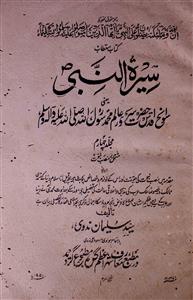
More From Author
Read the author's other books here.
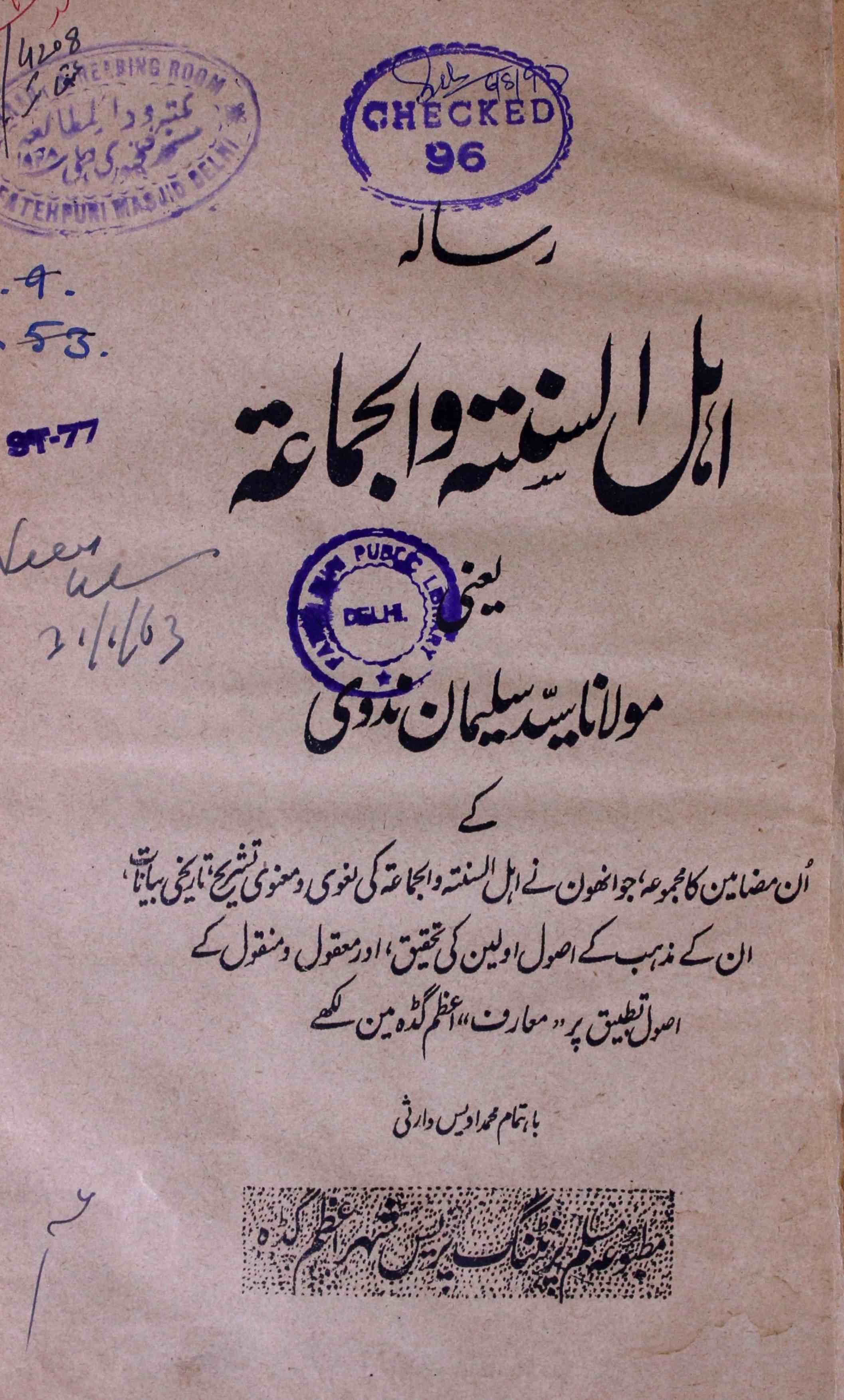
Ahl-e-Sunnata wal Jamata
.

Ahlul Sunnat Wal Jamat
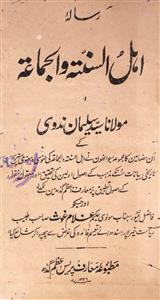
Ahlus-Sunnat Wal-Jamaat
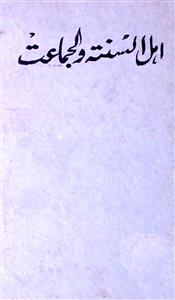
Arab wa Hind Ke Talluqat
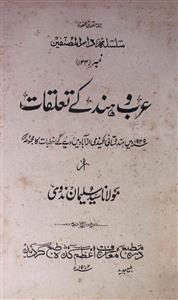
Arab-o-Hind Ke Talluqat
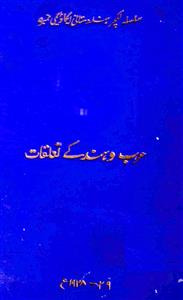
Arbon Ki Jahaz Rani
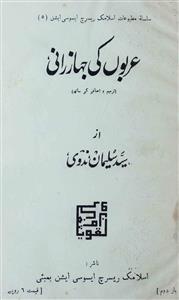
Arbon Ki Jahazrani
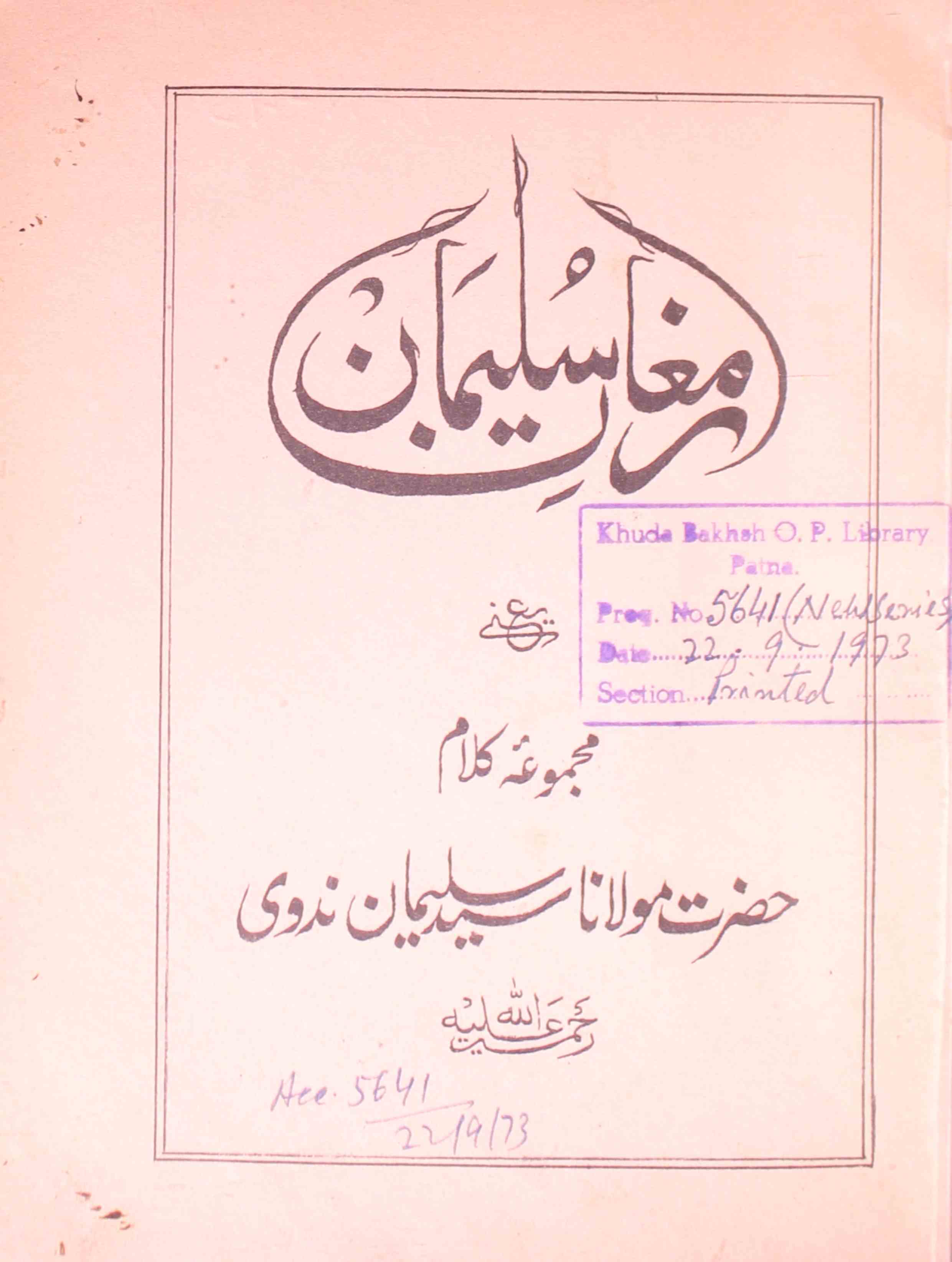
Armaghane-e-Sulaiman
Popular and trending read.
Find out most popular and trending Urdu books right here.

Kulliyat-e-Hasan
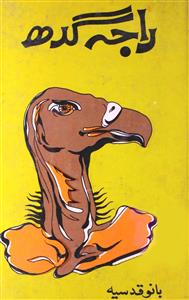
Dr. Nazeer Ahmad Ki Kahani Kuchh Meri Aur Kuchh Unki Zabani

Tarjuma-e-Tuzuk-e-Babri Urdu
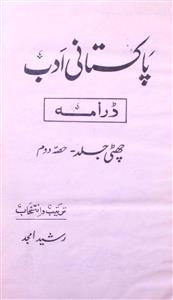
Pakistani Adab (Drama)
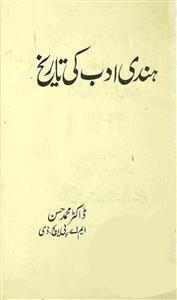
Hindi Adab Ki Tareekh

Nuqoosh-e-Adab
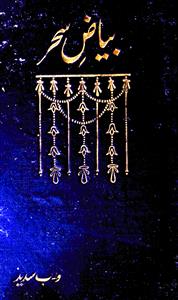
Bayaz-e-Sahar
Write a review.
Jashn-e-Rekhta | 8-9-10 December 2023 - Major Dhyan Chand National Stadium, Near India Gate - New Delhi
Rekhta Foundation
Devoted to the preservation & promotion of Urdu
Rekhta Dictionary
A Trilingual Treasure of Urdu Words
Online Treasure of Sufi and Sant Poetry
World of Hindi language and literature
The best way to learn Urdu online
Rekhta Books
Best of Urdu & Hindi Books
We will keep fighting for all libraries - stand with us!
Internet Archive Audio

- This Just In
- Grateful Dead
- Old Time Radio
- 78 RPMs and Cylinder Recordings
- Audio Books & Poetry
- Computers, Technology and Science
- Music, Arts & Culture
- News & Public Affairs
- Spirituality & Religion
- Radio News Archive

- Flickr Commons
- Occupy Wall Street Flickr
- NASA Images
- Solar System Collection
- Ames Research Center

- All Software
- Old School Emulation
- MS-DOS Games
- Historical Software
- Classic PC Games
- Software Library
- Kodi Archive and Support File
- Vintage Software
- CD-ROM Software
- CD-ROM Software Library
- Software Sites
- Tucows Software Library
- Shareware CD-ROMs
- Software Capsules Compilation
- CD-ROM Images
- ZX Spectrum
- DOOM Level CD

- Smithsonian Libraries
- FEDLINK (US)
- Lincoln Collection
- American Libraries
- Canadian Libraries
- Universal Library
- Project Gutenberg
- Children's Library
- Biodiversity Heritage Library
- Books by Language
- Additional Collections

- Prelinger Archives
- Democracy Now!
- Occupy Wall Street
- TV NSA Clip Library
- Animation & Cartoons
- Arts & Music
- Computers & Technology
- Cultural & Academic Films
- Ephemeral Films
- Sports Videos
- Videogame Videos
- Youth Media
Search the history of over 866 billion web pages on the Internet.
Mobile Apps
- Wayback Machine (iOS)
- Wayback Machine (Android)
Browser Extensions
Archive-it subscription.
- Explore the Collections
- Build Collections
Save Page Now
Capture a web page as it appears now for use as a trusted citation in the future.
Please enter a valid web address
- Donate Donate icon An illustration of a heart shape
Seerat -un- Nabi [Sallallahu Alaihi Wasallam] - URDU - By Shaykh Shibli Nomani (r.a) & Shaykh Syed Sulaiman Nadvi (r.a)
Bookreader item preview, share or embed this item, flag this item for.
- Graphic Violence
- Explicit Sexual Content
- Hate Speech
- Misinformation/Disinformation
- Marketing/Phishing/Advertising
- Misleading/Inaccurate/Missing Metadata

plus-circle Add Review comment Reviews
58,164 Views
DOWNLOAD OPTIONS
For users with print-disabilities
IN COLLECTIONS
Uploaded by MusalmanBhai003 on April 1, 2012
SIMILAR ITEMS (based on metadata)

IMAGES
VIDEO
COMMENTS
pdf download. Seerat un nabi (S.A.W) essay in Urdu free pdf download. Seerat e Rasool is a comprehensive study of the life of Prophet Muhammad (PBUH), encompassing his birth, upbringing, prophethood, and teachings. It covers his exemplary character, struggles and challenges, divine revelations, and ultimate mission of spreading Islam.
1 For the English translation of the Qur'anic verses in this book, Translation of the Meanings of the Noble Qur'an in the English Language , by Dr Muhammad Taqi-ud-Din Al-Hilali and Dr Muhammad Muhsin Khan (King Fahd Complex for the Printing of the Holy Qur'an, Madinah, K.S.A) has been used.
This year, the Eid Milad-un-Nabi (PBUH) would be marked on October 19 (Tuesday) in Pakistan with the same religious zeal and fervor. A few days back, Prime Minister Imran Khan has announced the formation of a Rehmatul-lil-Aalameen Authority aimed at portraying a true image of Islam besides carrying out research on Seerat-un-Nabi (PBUH) before ...
When we use the term "PBUH" on this page with the blessed name of Prophet Muhammad, we mean: 'Peace be Upon Him, His Family, His Noble Companions and His followers'. and 'May His mention be exalted' صلى الله عليه وسلم. Importance of knowing the Seerah: Allah SWT has said in the Noble Quran: Ye have indeed in the Apostle of Allah ...
Seerat Un Nabi Vol II (English ) Bookreader Item Preview ... Seerat Un Nabi SallALLAHU ALAIHI WASALLAM (The Life of the PROPHET) by ALLLAMA SHIBLI NOMANI. Second VOlume in English. Addeddate 2013-01-23 10:02:15 Identifier SeeratUnNabiVolIienglish Identifier-ark ark:/13960/t5j97gp52 ...
Essay On Seerat-e-Nabvi in Urdu- In this article we are going to read Essay On Seerat-e-Nabvi in Urdu | سیرت نبوی پر ایک مضمون, essay on seerat un nabi in urdu for class 8, seerat un nabi essay in urdu with headings, essay on seerat un nabi in urdu for class 6, essay on seerat un nabi in urdu written, seerat e nabi short essay in urdu, seerat un nabi sallallahu alaihi ...
Essay on Prophet Muhammad (SAW) In English | Seerat Un Nabi Essay in English | essay writing1. Essay on Prophet Muhammad SAW2. speech on seerat un nabi3. be...
Seerat-un-Nabi (Sallallahu Alaihi Wasallam) is arguably one of the greatest and most authentic biographies of the Prophet Muhammad (Sallallahu Alaihi Wasallam), written in Urdu by Shaykh Shibli Nomani and his student, Shaykh Syed Sulaiman Nadvi in 6 volumes.
Summarizing such a deep journey leaves one in tears because of its rich lessons, strong Islamic teachings, and its effect on moral character. "Seerat Un Nabi" calls to mind self-improvement as well as a reflection towards its teaching, which reverberates similar traits manifest by our Prophet Muhammad (May peace and blessings be upon him).
In the voice of Maulana Makki (Senior Hanafi Shaykh in Makkah), bayanaat on seerat life of beloved Prophet Muhammad ﷺ in most effective way, in which life of Arab before the birth of Prophet Muhammad ﷺ & after he departure from this world, narrations described in an heart whelming way. In the voice of Maulana Makki (Senior Hanafi Shaykh in ...
Courtesy: Al-Maktaba Al-Salfiah, Sheesh Mahal Road, Lahore 54000. Pakistan. Ph: 042-7237184 Fax: 042-7227981. 1. A graphical and illustrative presentation (CHARTS) of the Life of Muhammad (pbuh) in Urdu language. 2. Seerat Nabvi by Tibri, Kathir and Khaldoon in Urdu language. 3. Al-Raheeq Al-Makhtoom in Urdu language. PDF Format 4. Al-Raheeq Al-Makhtoom in English language The Sealed Nectar in ...
The last in this series of books was "Sirat-un-Nabi", which remained unfinished till his last breath. Later, it was completed and published by his student Syed Sulaiman Nadvi. In addition to these works, Shibli wrote numerous historical and research articles, which gave rise to a general interest in history and historiography.
seerat un nabi in urdu essay with headings - سیرت النبی پر ایک مضمون. Hazrat Muhammad (sallallahu alaihi wasallam ) is the central figure of Islam and is considered its most perfect human being. He was born in Makkah in 570 CE and belonged to the Quraish tribe. At an early age, he displayed qualities that distinguished him ...
Sirat-un-Nabi (Life of the Prophet) is arguably one of the greatest and most authentic Sirah Rasul Allah (biographies) of the Islamic prophet Muhammad, written in Urdu by Shibli Nomani and his student, Sulaiman Nadvi in 6 volumes.. The work started with the financial assistance of the late Nawab Sultana Jehan Begum of Bhopal and later through the aid of the Nizam of Hyderabad.
Satisfactory Essays. 2192 Words. 9 Pages. Open Document. "SEERAT- UN - NABI". (May Allah's Blessings & Peace Be Upon Him) Muhammad was the humblest at the zenith of his achievements. If a man's world-admired accomplishments or the wealth and fame he has gained do not change him, if he can remain as humble as he was at the beginning of ...
Seerat-Un-Nabi (PBUH): After a gap of some 600 years without a prophet on earth, Allah Almighty got mercy upon astray humans in 570 AD and sent his final Messenger Hazrat Muhammad (Peace Be Upon Him) to pull them out of the darkness of obliviousness and show the righteous path, leading to success in this world and hereafter. Before the Last ...
4.19. 1,405 ratings88 reviews. Sirat-Un-Nabi (Life of the Prophet) is considered one of the most famous and authentic biographies of the Islamic prophet Muhammad (PBUH). Nomani had only managed to complete the first two volumes when he died in 1914. His loyal disciple Syed Sulaiman Nadvi, who was working with him as his literary assistant on ...
#Seerat-UN-Nabi_islam_StudioSeerat-UN-Nabi - Hazrat Muhammad ﷺ Story in Urdu ( PART -1 ) History OF Prophet Muhammad ﷺIslam Studio is a search engine that se...
Topic :: Seerat-un-Nabi Audio :: Dr Idrees Zubair Book :: Ar-Raheeq Al-Makhtum (Urdu & Hindi) The Sealed Nectar (English) Here we are presenting the life of ...
Jashn-e-Rekhta | 8-9-10 December 2023 - Major Dhyan Chand National Stadium, Near India Gate - New Delhi. GET YOUR PASS
Seerat -un- Nabi [Sallallahu Alaihi Wasallam] Addeddate 2012-03-31 22:17:46 Identifier Seerat-un-NabisallallahuAlaihiWasallam-Urdu-ByShaykhShibliNomani Identifier-ark ark:/13960/t2p56nz5c Ocr ABBYY FineReader 8.0 Ppi 100. plus-circle Add Review. comment. Reviews There are no reviews yet.
Seerat un Nabi essay in English | The holy Prophet essay | Seerat un Nabi speech on Seerat un Nabi Assalam-o-Alaikum Friends!! I hope you are fin...
Great Speech_ By Usama Hassan || Topic: Seerat un Nabi ( PBUH);سیرت النبی (ص) Welcome to my YouTube channel.....This video is for all Humanity.....